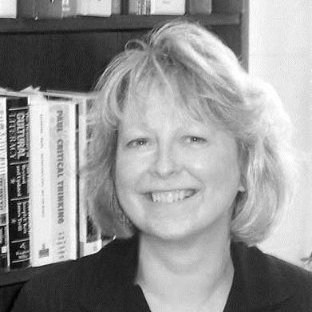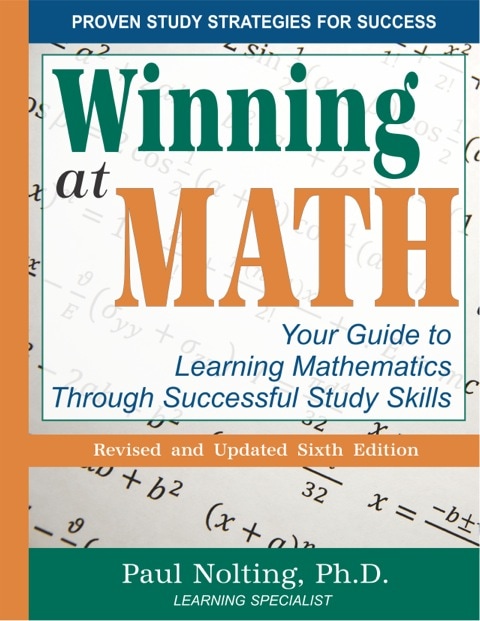Dr. Paul Nolting's Academic Success Press Blog: A Publication Dedicated to Math Success |
DR. PAUL NOLTING'S ACADEMIC SUCCESS PRESS BLOG
ASP Blog: Can you start by describing the current state of college developmental mathematics (as you see it)? Paul: Sure. I think what is exciting about developmental mathematics in general is that people are trying different things. Organizations are involved in efforts to redesign and improve mathematics education, as well as to develop solutions that promote student success and completion. Now there are multiple pathways for success in mathematics, which I think is exciting. I don’t think there is a silver bullet—I think there are different approaches that work for different students based on their needs and learning styles. Colleges and universities are open to exploring options and strategies to help students be successful and are taking math courses that are aligned with their chosen careers path. ASP Blog: During the past few months, as I have been discussing developmental math with professionals from across the country, what I have found interesting is that the national redesign movement is producing so many answers—answers that many educators have had for years but were incapable, until recently, of putting into effect. Not all of these answers, however, gel together. Because the redesign movement is providing unprecedented channels to voice long-brewing strategies and ideas, I imagine the whole process could devolve into chaos if people aren’t willing to bend or aren’t willing to admit they are wrong when something isn’t working. Do you agree? Paul: I think that is an excellent point. It shouldn’t devolve into chaos—but at some places there may be many problems. It is clear that as funders, legislators, and organizations have pointed out that changes are needed, faculty across the country have been examining the problems and working to find ways to better address student needs. With this focus on improving success, there are several types of redesign that are showing promise, including acceleration, compression, mainstreaming, and contextualization. ASP Blog: Right. This brings up another major issue with math redesign and particularly the pathway system. Students often change majors. Many of the experts I have spoken with have vocalized fears that by pushing students away from more complicated math courses, we risk putting behind the eight-ball those students who might later shift to comparably demanding majors. Paul: I think that is an issue we have to address, but I think it is doable. I think students need options that are appropriate to the major/career they select. Also, if you are talking about basic math, students need to know the basics no matter which major is selected. The next level of math—the one that involves getting students into certain careers—we need to be clear about the pathway at the very beginning when students are advised. I don’t think students will fall too far behind if we give them the basics in developmental math, and then we help them pick their path based upon the career they are choosing. ASP Blog: Right. At some point you do have to make a decision on a pathway. Students have always changed majors. It is not like these new pathways are creating a new problem. Paul: Right. The best we can do is advise students based on their selected majors. ASP Blog: How does NADE, specifically, help faculty, college, and universities to develop math redesigns and/or improve math success? Paul: One of the major ways NADE helps faculty and colleges is via the Certification Council, which certifies that developmental education programs meet certain approved standards. The NADE Certification Council exists to improve and enhance the success of students at all levels of academic preparation, as well as to facilitate the professional growth of developmental educators by setting standards of best practice, emphasizing the use of theory to inform practice, and promoting effective evaluation and quality research in developmental education and learning assistance programs. The Council’s goals are 1) to promote quality program practices through professional standards and evaluation; 2) to advance research and evaluation in the field; 3) to create processes by which programs and services use self-study and evaluation to improve and enhance student success; 4) to contribute to the broader integration of theory and research with practice in the field; 5) to provide access to quality program models; and 6) to acknowledge and validate programs that meet or exceed standards of best practice. NADE also provides three print resources: the NADE newsletter, the Journal of Developmental Education, and the NADE digest in addition to a national conference each year. ASP Blog: Is this perhaps NADE’s greatest function? Bringing people together, furthering discussion, serving as a nexus point for developmental educators? Paul: Yes. NADE is the largest professional association in the field who promote and advance the profession, and provide resources and professional development opportunities to improve practice. It is so important to have an organization that directly involves the practitioners. NADE serves practitioners and provides opportunities for professionals in the field to share information—like the National Math Summit. NADE has developed partnerships with key players involved in shaping the reform movement and the redesign landscape of developmental education. Players like Paul Nolting and the Carnegie Foundation, AMATYC, the Dana Center, and others working to promote student success. NADE provides opportunities to get together to talk about what is working, what is new in the field, and the most recent research, thus encouraging conversations among higher education professionals. ASP Blog: This brings us to something Dr. Nolting is extremely passionate about: The National Math Summit on March 15-16 at the 2016 NADE conference. What can potential attendees expect during this event? Paul: The National Mathematics Summit is a response to national discussion in developmental education in mathematics reform and redesign. This preconference forum was created to allow experts who have conducted scholarly research and institutionalized programs to discuss best practices and techniques in the field of mathematics education. Many organizations, foundations, and centers have developed valuable strategies that have proven to promote student success and completion. This summit will serve as a national forum to discuss issues related to redesign and assessment of mathematics reform. It is designed to allow opportunities for math professors and program administrators to look at what the reform movement has accomplished and consider next steps. Although much of the data are preliminary, it appears that more students are passing remedial math and completing college math courses. The summit is a great opportunity for educators to meet national experts from various organizations such as the American Mathematical Association of Two-Year Colleges, the National Association for Developmental Education, the Carnegie Foundation, the Dana Center, the National Center for Developmental Education, and the Mathematical Association of America. There will be opportunities for discussions with a panels of experts and opportunities to attend workshops specific to certain areas of redesign and assessment. ASP Blog: In the past, what role has NADE played in these summits? Paul: NADE has been a partner. NADE’s mission is to promote and advance the profession of developmental education and to provide resources and professional development opportunities to improve the field of developmental education. Redesign is very important in a lot of states, and NADE believes that it is vital to work with other organizations [involved in the summit] to help provide quality professional development for practitioners in the field. And that just about wraps it up! We also spoke to Taunya Paul at length about specific ways to help institutions improve math success. We will run this second interview sometime in the near future.
5 Comments
1/1/2017 02:01:31 am
I want to say thanks to you. I have bookmark your site for future updates.
Reply
10/4/2017 08:45:12 am
Get a discount by using the code GETdiscount10 at the first order from https://evolutionwriters.com.
Reply
10/10/2017 03:16:12 pm
How to structure essays to make them feel more manageable, and to know for sure that you are getting in all the relevant points so you don't miss out on any marks! By breaking essays down into manageable paragraphs and sentences its amazing how much you can write, whilst all the time knowing that each sentence is getting a tick and a mark placed next to it by the examiner!
Reply
12/25/2017 04:29:13 pm
How to teach a child to read with the help of reading head start program. You can teach kids read and learn phonics with easy to learn lessons.
Reply
Leave a Reply. |
AuthorDr. Nolting is a national expert in assessing math learning problems, developing effective student learning strategies, assessing institutional variables that affect math success and math study skills. He is also an expert in helping students with disabilities and Wounded Warriors become successful in math. He now assists colleges and universities in redesigning their math courses to meet new curriculum requirements. He is the author of two math study skills texts: Winning at Math and My Math Success Plan. Blog HighlightsAmerican Mathematical Association of Two-Year Colleges presenter, Senior Lecturer-Modular Reader Contributions
|
Proudly powered by Weebly


 RSS Feed
RSS Feed